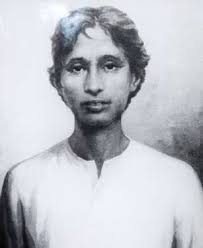
Khudiram
Khudiram was an Indian nationalist who was born on 03 December 1889 in the small village of Habibpur, which is a part of the Keshpur Police Station in the Midnapore district of West Bengal. He was the only son of a Tehsildar and had three sisters. Khudiram’s life was ridden with hardships right from the start. He lost his mother when he was Five years old. His father died a year after. Aparupa Roy, his elder sister, brought him to her house at Hatgachha village under the Daspur Police Station and thereafter he was raised by his elder sister. He attended Hamilton High School in Hatgachha village in the North 24 Parganas District.
Khudiram was one of India’s youngest freedom fighters, and in the early 1900s, it was the public speeches of Aurobindo Ghose and Sister Nivedita which prompted him to join the freedom struggle. In 1905, during the Partition of Bengal, he became an active volunteer in the freedom movement. Khudiram was all of 15 when he first courted arrest for distributing pamphlets against the British administration.
It is said that in 1908, Khudiram joined the Anushilan Samiti, an early 20th-century revolutionary group that resorted to violent means to force the British out of India. Nationalists such as Aurobindo Ghose and his brother Barindra Ghose spearheaded the Samiti. It was here that Khudiram got fully involved in anti-British activities. Not just did he learn how to make bombs, he would plant them in front of police stations to target government officials.
Douglas H Kingsford was the Chief Presidency Magistrate of Calcutta at the time. He was a target of the revolutionaries as he was known for his harsh treatment and vindictiveness towards the freedom fighters. Kingsford was especially enraged by the anti-partition and the swadeshi activists. Numerous assassination attempts on Kingsford had gone in vain. The British authorities transferred him to Muzaffarpur with the hope that the anger of the revolutionaries would die down.
However, the revolutionaries were determined to see the end of Kingsford. The initial idea was to detonate a bomb in the courtroom where Kingsford presided. After much debate, it was decided to avoid the court since a large number of civilians could be injured. The leaders then decided to appoint Khudiram Bose and Prafulla Kumar Chaki to carry out the mission of assassinating Kingsford.
Following that, on 30 April 1908, after much planning, they attacked Kingsford’s carriage while it was leaving the club. As the horse carriage drew near, Khudiram hurled a bomb at it. However, it was discovered later that the carriage was carrying the wife and daughter of a barrister called Pringle Kennedy, and Kingsford had escaped yet another attempt on his life.
News of the attack swept the entire town, and the Calcutta police were summoned to apprehend the duo. While Bose was apprehended at Waini train station, where he had arrived the next morning after walking 25 km, Prafulla Kumar Chakki committed suicide just before being arrested. The entire community gathered around Bose when he was led handcuffed to the Muzaffarpur police station. Finally, after numerous trials and hearings, Khudiram was sentenced to death. Young Khudiram, at the age of eighteen, was executed on 11 August 1908, making him one of the youngest revolutionaries in India to be hanged by the British.
Newspapers like the Amrita Bazar Patrika (Bengali) and The Empire (British) reported that such was the spirit of this boy revolutionary that he was smiling while mounting the scaffold. Large crowds thronged the route through which his body was taken out in procession. The people kept throwing flowers, silently acknowledging his sacrifice for the cause of freedom.
While Bose’s story of sacrifice and love for his country is popular folklore in Bengal, the poet Pitambar Das made his sacrifice immortal in the popular Bengali song Ek Baar Bidaye De Ma, a song that resonates with the passion the young boy had for his motherland.
By: MADHAV
Write and Win: Participate in Creative writing Contest & International Essay Contest and win fabulous prizes.


